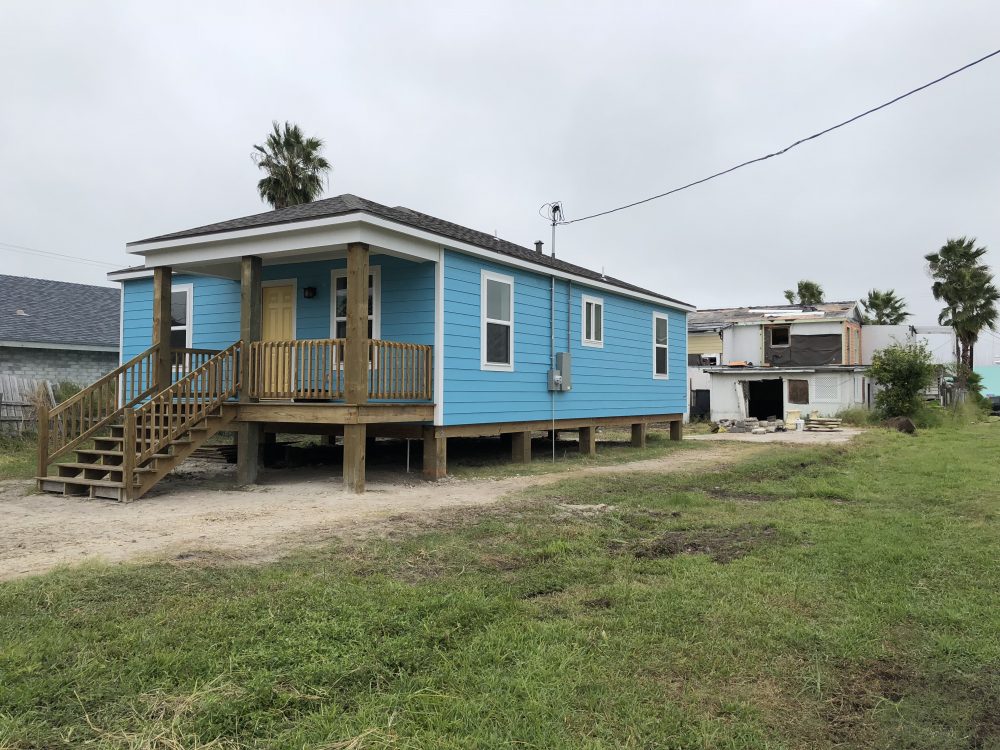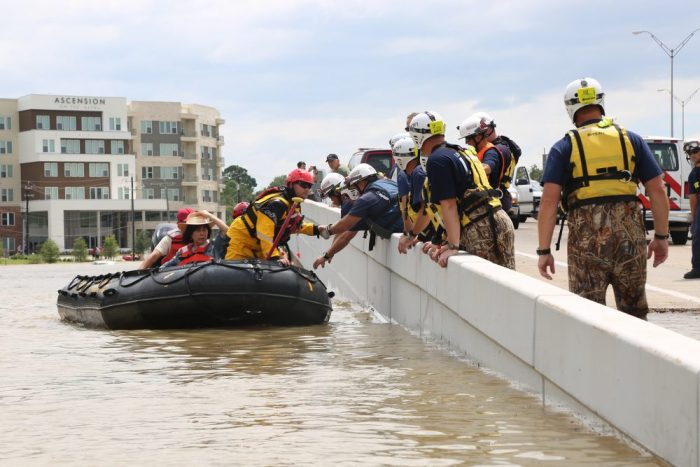Ten New Grants to Keep Recovery Going in Texas
More than two years after Hurricane Harvey made landfall in Rockport, Texas (Aug. 25, 2017) and traveled up the coast, inland, back out to sea and inland again, there is STILL a lot of work to be done to recover from the storm in all 41 counties that received a federal disaster declaration. And thanks […]

More than two years after Hurricane Harvey made landfall in Rockport, Texas (Aug. 25, 2017) and traveled up the coast, inland, back out to sea and inland again, there is STILL a lot of work to be done to recover from the storm in all 41 counties that received a federal disaster declaration. And thanks to thousands of donors to the CDP Hurricane Harvey Recovery Fund, we are pleased to announce another round of funding to support local recovery.
- All Hands and Hearts –$107,506 to support the continuation of their housing repair and rebuild work in the Coastal Bend area of Texas. All Hands and Hearts has been one of our best partners in the Coastal Bend area and is one of the few international organizations still working there. They have also been solid partners with the local recovery group and other nonprofit organizations, due in part to their willingness to be flexible in their response in order to meet the needs of the local communities where they are working.
- Baytown Area/Chambers County United Way (LTRG) –$100,000 to continue to provide housing repair and rebuild projects in the Baytown area where the needs for this work and the difficulty of the repairs is increasing. This United Way coordinates the long-term recovery process for their community and has worked as a strong convener of all the local and national groups working on recovery here. As their work is progressing, they are now seeing that sufficient state and federal funds to support remaining recovery needs are becoming increasingly more difficult to address. Our funding will allow them to sustain their capacity for recovery as they continue to focus on rebuilding their community.
- Coastal Bend Disaster Recovery Group – $85,000 to provide disaster case management staff in order to maintain the program so that the recovery progress can continue. FEMA grant funding for disaster case management is ending and there is still tremendous need for this work. At this point in recovery, the cases have become more difficult and complex so these funds are needed to effectively and efficiently provide recovery services to clients in the area.
- Galveston County Long Term Recovery Group –$77,250 to continue to support data management and other operational expenses for sustaining the recovery in their service area. This is one of the first long term recovery groups (LTRGs) we funded and they have been one of the most consistently successful groups with whom we’ve worked. They have solid, experienced leadership and their data gathering and tracking system has allowed them to focus their limited resources on the most critical needs of their community. Our funds will help them sustain their good work and allow them to continue to leverage their information and resources to engage other organizations in the area.
- Good360 –$125,000 to continue to fill material gaps in some of the hardest hit and least funded areas – the Golden Triangle of Jefferson, Orange and Hardin Counties, plus Brazoria County. I have been so very impressed with the work of Good360 in Texas post-Harvey. Whenever we have learned of a grantee or other recovery organization struggling to access materials to do their work, we have connected them to Cacique Rich-Martinez, the Regional Disaster Manager working here. He has been so responsive and the funding we’ve provided this organization has gone a long way to supporting a strong recovery. They are committed for the long term and have been both strategic and creative in addressing the material needs of our communities.
- Hardin County Strong –$75,000 to supplement additional funds they’ve secured to replace four homes. With full support of a strong county judge, Hardin County Strong managed to corral community resources along with statewide and national resources to move Hardin citizens along the recovery path. I recently attended a celebration of their successes. The local high school performing arts center was full of community leaders, Harvey survivors, surrounding county leaders and nonprofit organizations — all there to show appreciation for the community work that had already been completed and to acknowledge the work still to be done.
- Houston Immigrant Legal Services Collaborative (HILSC) – $75,000 to support the continuation and implementation of the Humanitarian Action Plan and the NeedHOU open source social services database. I’ve been a fan of the work HILSC has done to support the immigrant community here from the very beginning. Though they didn’t expect to be a leader in disaster response, recovery and resilience, when they saw that gaps needed to be filled, they stepped up and did what needed to be done. They’ve also been tremendous partners to us as we’ve worked to educate and inform our partners about the need to focus on our vulnerable immigrant and refugee communities. The plan they are implementing is well-received in the community and will make for a better response in Houston for future disasters.
- Mental Health Association of Greater Houston (MHAGH) – $75,000 for a new pilot program to address the hoarding issues that rebuild/repair organizations have been seeing as they’ve tried to support client recovery. I had heard for quite some time that this was becoming a significant problem for some of our grantees in this area, and we had been looking for a way to address it. MHAGH has developed curricula and a plan to support these organizations and their clients. They have been integrated into the recovery process from the very beginning, working strategically with schools, long-term recovery groups and other nonprofit organizations to address many of the mental health needs for Harvey survivors.
- Orange County Disaster Rebuilds – Part of the Golden Triangle of Texas, Orange County has received $75,000 to help build and sustain their staffing capacity for recovery. The funds will be used to support administrative staff for two additional years. Orange County Disaster Rebuilds has done a great job of energizing their community to support recovery there. Michelle Tubbleville, executive director, has been a force and has creatively addressed the needs of her county’s citizens. A little administrative support will go a long way to helping her do even more to support recovery.
- Victoria County Long Term Recovery Group (VCLTRG) – $76,336 to cover staffing costs, unmet needs expenses and warehousing expenses in order to sustain their recovery work. This group in Victoria County has also been creative in addressing the needs of their citizens. Hope Meadows neighborhood in Bloomington, is a new neighborhood being developed to relocate low-income residents away from likely flood areas. We funded this project through the Golden Crescent Habitat for Humanity, but the VCLTRG was where this idea originated and they are the lead partner for the project. They’ve also been creative in addressing warehousing, office and volunteer housing by working with funders and the county to identify space to develop the Victoria County Recovery Center. This project will enhance response and recovery in the area for future disasters as well as help with current needs in Harvey recovery. This LTRG definitely stands out as a shining example of how best to manage county-wide disaster recovery.
Many of the names of these grantees may look familiar. At the direction of the CDP Hurricane Harvey Recovery Fund Grant Committee and the CDP Board of Directors, this final round of funding was to focus on sustaining the good work of our existing grantees. We specifically wanted to be sure that those who had a proven track record for recovery success would have the resources to complete their work for their communities.
These 10 grants total $871,092, the remaining amount available in the Fund for grantmaking. As a Texan, I’ll still be here though, working with our grantees to ensure their work is completed; analyzing and evaluating the work that we at CDP have done to support recovery here; and telling the great stories of resilience in Texas – and maybe some not so great but important lessons learned – that deserve to be told.
Thank you for hanging in there with us these past two-plus years. We here in the Lone Star State are proud to be Texas Strong.
More like this

Are We Experiencing Donor or Disaster Fatigue?

